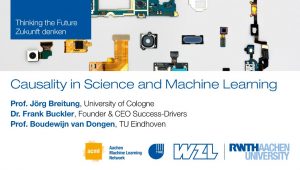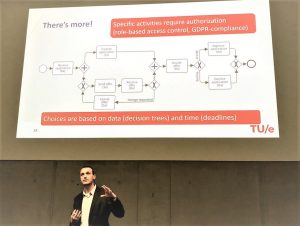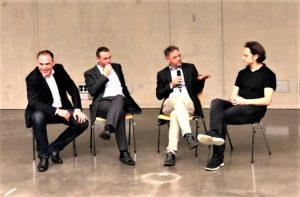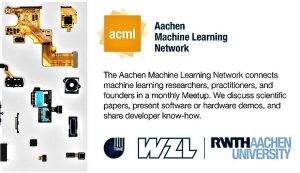Causality in Science and Machine Learning
Aachen Machine Learning Network, November 28th at RWTH Aachen – Experts shared their experience, how to use new methods to explore causal structures from data. Sound methods for causal analysis are young and widely unknown:
- Prof. Dr. Jörg Breitung, University Cologne: “Causal Analysis in Empirical Economics – attribution of influencing factors in time series“
- Dr. Frank Buckler, Founder & CEO Success-Drivers: “The Search for Success Drivers: How machine learning helps to explore root causes of success – for business strategies, other complex systems or even soccer“
- Prof. Dr. Boudewijn van Dongen, TU Eindhoven: “Process Analytics: Data Analytics driven by Causality. Mining real world data to find networks that model the causal behavior of multi-faceted complex interactions“
Introduction
The meetup event with 300+ attendees at C.A.R.L. was opened by Eckhard Siegmann, who talked about the history of causality research and gave a brief overview of the methods that Judea Pearl presents in “The Book of Why“.
Eckhard Siegmann opening #ML network meetup @RWTH #RWTH #Aachen : #Causality in #Science and #MachineLearninghttps://t.co/tpmODDchA3… #AI #KI #artificialintelligence #DeepLearning #datascience pic.twitter.com/NX9KEjiu44
— Thomas Fabula (@TFConsult) November 28, 2018
Causal Analysis in Empirical Economics
Prof. Dr. Jörg Breitung:
“Today, two different concepts are typically used for the causal analysis of economic data: (1) Granger causality tests are based on the notion that knowing the cause should help to forecast the event. Accordingly, Granger causality boils down to testing the predictive ability of some variable that is considered as a (prima facie) cause of the event. (2) The microeconometric approach analyses the data as if it was generated by a controlled experiment. Accordingly, this concept adapts statistical methods from analysing clinical trials. After an introduction to both concepts merits and drawbacks are discussed.”
Prof. Joerg #Breitung @UniCologne #University #Cologne: "Causal #Analysis in Empirical #Economics – attribution of influencing factors in time series". #Aachen #ML network @RWTH #RWTH #AI #KI.nrw pic.twitter.com/gJQTrJlMbr
— Thomas Fabula (@TFConsult) November 28, 2018
The Search for Success Drivers
Dr. Frank Buckler: “The Search for Success Drivers: How machine learning helps to explore root causes of success”
“Existing causal structure learning approaches have several deficiencies that can be overcome by Universal Structure Modeling. It will be explained how this method works and why and when it is possible to conclude causality. Some application examples highlight why Universal Structure Modeling is so useful and relevant today.”
Frank Buckler @Frank_Buckler from #SuccessDrivers „The Search for Success Drivers: How #machinelearning helps to explore root causes of #success"#RWTH #Aachen @RWTH #ML #AI meetup #KInrw pic.twitter.com/QlmuZn4Nb0
— Thomas Fabula (@TFConsult) November 28, 2018
Video
Causal Machine Learning by Frank Buckler on YouTube
Process Analytics
Prof. Dr. Boudewijn van Dongen: “Process Analytics: Data Analytics driven by Causality”
“Each time two or more activities are performed to reach a certain goal, fundamental principles of processes apply. A key concept in processes is causality. One activity leads to the next and ordering matters. One can, for example, not approve a request before receiving it. In process analytics, we exploit this knowledge and we mine data to obtain explicit insights into these causal relations in the form or Petri nets, C-nets, or other process notations. The research in the my research group continues to expand outward from a classical situation of data with clear case notions in the context of explicitly structured processes to a broad, multi-faceted field, where processes are less structured or consist of many interacting artifacts and where case notions in data become more fluid or are complex, multi-dimensional networks.”
Debate
The closing panel debate was moderated by Eckhard:
“How can causal methods find their way into education, science and business?”
Eckhard @SiegmannEckhar: “we are all #pioneers …“ @RWTH #RWTH #Aachen #MachineLearning #ML #AI #KI #artificialintelligence #DeepLearning #datascience #causality pic.twitter.com/odvM0qre3i
— Thomas Fabula (@TFConsult) November 28, 2018
Further Information






